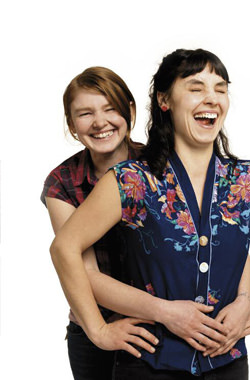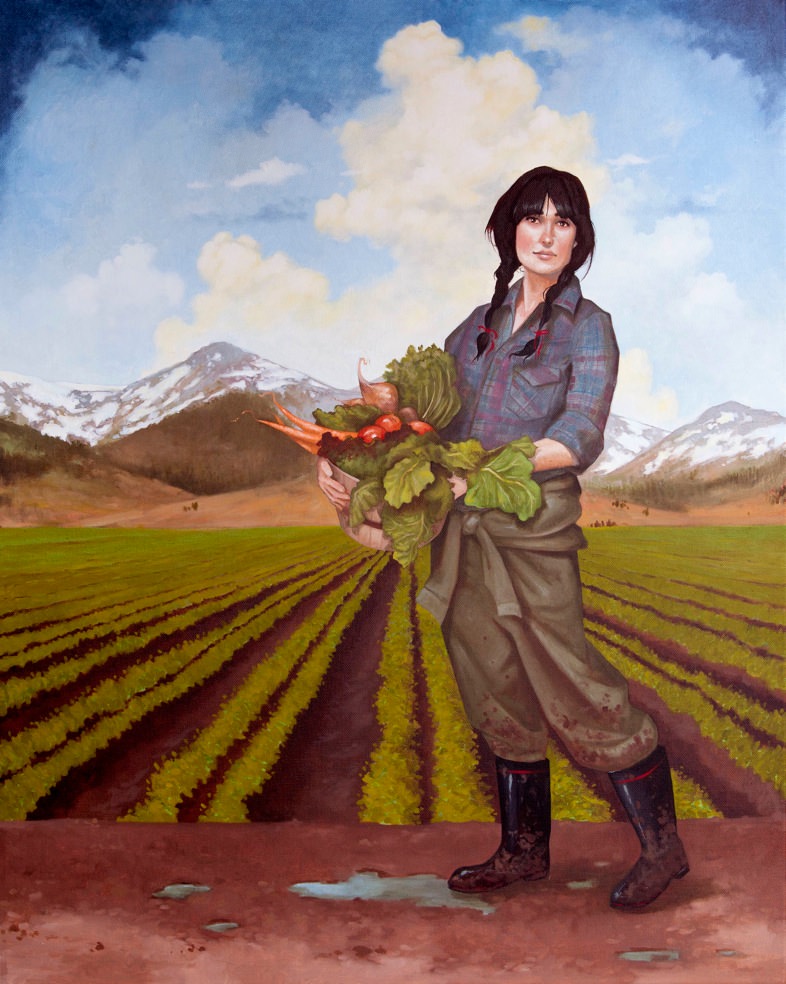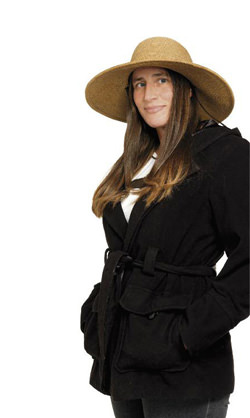WOMEN OF LOCAL FOOD
Meet a dedicated group that is changing the way we eat and creating edible connections to last a lifetime.
WRITTEN BY ANN LINDEMANN
PHOTOS BY JEFF ROSS, PAINTING BY AHREN HERTEL
Some would laugh at the premise of an article that focuses on women in agriculture. Women, they might argue, have long been an integral part of farm and ranch life; there’s nothing new there. Not quite, says Temra Costa, author of Farmer Jane: Women Changing the Way We Eat, a 2010 book that profiles women farmers, educators, advocates, and chefs who are altering the way our nation eats.
“Thirty percent of the farms in the U.S. are owned and operated by women –– it’s one of the fastest growing demographics in agriculture,” Costa says, adding that our region is no exception. These women, she explains, are tending towards diversified, direct-marketed foods that create relationships with the eaters.
Be it a grower, a rancher, a grocer, or an advocate, Costa says women are marketers and community builders by nature. Costa writes that women “lean towards relationships and long-term strategies that prioritize future generations.”
The author is by no means a knee-jerk feminist in her analysis. She acknowledges that men are most certainly involved in the movement and their efforts have been well represented in the press.
“Women, on the other hand, have long been underrepresented in the public sphere about the sheer amount of work they do, at home and outside their home, in food planning and preparation, while advocating for a healthier food system and environment,” she writes.
Costa believes that such women are our modern heroes because of their “every day acts of living, by becoming the fastest growing number of diversified farmers in the country, controlling the majority of household spending, dominating nonprofits dedicated to shifting the balance from conventional to sustainable foods, and through the creation of menus and businesses that reflect their social environmental values.”
Fortunately, our region is rich with such champions for change. What follows is a sampling of the scores of Reno-Tahoe women –– from growers to grocers –– who are diligently transforming our region’s food system.
|
|
| Fallon Farmer Salisha Odum |
GROWING DELICIOUS
On a small parcel of land Fallon Grower Salisha Odum makes big things happen. The 35-year-old mother of four and longtime gardener started exploring organic growing methods seven years ago. In 2009, Odum produced $20,000 worth of vegetable and herb crops on her farm called Salisha’s Delicious, and this year she doubled that amount. With a seemingly limitless well of energy, Odum supplies produce to the Great Basin Community Food Co-op, six different CSAs, and even pulls together her own CSA boxes for 15 or so of her neighbors.
“To me there’s no question between whether to go organic or not,” Odum says. “It’s really important for me to give the community another way to buy food.”
Amazingly, with the exception of a 16-year-old son who pitches in when he can, Odum does the lion’s share of the farm work herself. Sure, Odum is proud that she’s earning a modest living from her organic farm. But she’s especially gratified to play a role in educating her community about a healthy, locally sourced diet.
Odum grows a wide variety of greens, as well as plenty of root vegetables, broccoli, eggplants, peppers, tomatoes, and celery. She has four hoop houses, which allow her to keep plants growing through fall and winter.
“I have a passion for digging in the dirt; it’s my higher calling,” she explains. “I’m happy to be able to feed good food to good people.”
For details, call 775-427-5167 or email whvmkv@phonewave.net.
NURTURING LIFE
Whether she’s attending a spring calving or pitching winter hay to the herd, Hannah Tangeman pays homage to the women who have been doing these same chores on this same sheep and cattle ranch for the past 100 years.
Encompassing 2,700 acres of meadow and timber, the Susanville, Calif., Hulsman Ranch has been in the family since 1862. Tangeman’s maternal great-grandmother took over the reins in 1914, followed by her great aunt in 1932, and later her own mother in 1961.
“Dad was a vet, but mom always ran the ranch,” Tangeman, 51, recalls, adding that ranching is a good fit for women who are already hardwired for creating, sustaining, and nurturing life.
After a college stint –– where she realized “clearly the world doesn’t need another lawyer” –– Tangeman came home to work side by side with her mother.
When their mother passed away in 1990, Hannah and sister, Susan, a veterinarian, felt an important torch was being passed. In particular, the Tangeman daughters wanted to honor the family’s loyalty to the shorthorn cattle breed, as well as abide by the same closed-system principles that were used when the ranch was founded.
Unlike big feedlot operations, all sheep and cattle are born and raised on the Hulsman Ranch. Nothing, except for an occasional bull for breeding, is brought in from off-site. Just like it was in her namesake great-grandmother’s time, Hannah Tangeman’s animals wander the pasture, munching on native grasses and hay that grow on the ranch. Importantly, the animals are never fed grain and their diet is not supplemented with hormones or antibiotics.
“Our customers are supporting our farm … they want us to succeed,” she adds. “It’s all consumer-driven; every dollar that people spend on food determines the destiny of farmers like us.”
Hulsman Ranch grass-fed beef and lamb are available for purchase from farmers’ markets in Quincy and Susanville. The meat is sold frozen and vacuum-packed in a wide variety of cuts. For details on where else to purchase Hulsman Ranch meat, email hulsmanranch@frontiernet.net or call 530-257-7262.
 |
| Local Food Advocate Jana Vanderhaar |
COMMUNITY ORGANIZER
Jana Vanderhaar pulls no punches when she attempts to explain the impetus behind her local food advocacy efforts.
“I’m a food snob –– food is my one prejudice,” the Netherlands native says matter-of-factly while sipping a perfectly brewed cappuccino at a bustling Reno coffee shop.
A landscape architect by trade, Vanderhaar has taken her habitat-creating impulses to a whole new level of commitment. Vanderhaar is a sustainable living visionary who is getting the message out to our region through act and deed.
She was one of the ground-floor planners of the Great Basin Community Food Co-op Local Food Committee and later launched the co-op’s seedling sales that help connect local farmers with their consumers every spring and fall. A River School Farm contributor, Vanderhaar has channeled her local food and sustainable living passion into a bevy of influential new community-based reskilling workshops.
“It’s all about realizing where your food is coming from –– and it’s not just the distance, but how it is grown, too,” she says.
Vanderhaar believes in reaching out to the community, especially young people who may have little understanding of how food is sourced. To that end, Vanderhaar is involved in Friends of Nevada Organics and Urban Roots Garden Classrooms, which both focus on education.
“It’s huge when kids get to see those carrot seeds grow and then make their own lunch using those carrots … it warms your heart,” she says.
Casting her visionary net even wider, Vanderhaar recently helped kick off Transition Reno, a collaboration of local groups and citizens who are working together to increase community resilience in the face of peak oil and global climate change.
“It’s about decreasing our footprint and being smarter about our choices,” Vanderhaar says.
To be an advocate for the local food movement, visit Transitionreno.ning.com, Urgc.org, Riverschool.info, and Nevadagrown.com.
SMART SHOPPING
 |
| Grocers Nicole and Amber Sallaberry |
Here’s the story of two sisters who grew up on a farm smack dab in the middle of Reno, left for education and exploration, and then returned to help found The Biggest Little Co-op in the World.
In 2005, Nicole and Amber Sallaberry were key participants in the now-famous (at least in some circles) 2005 potluck that united a group of like-minded people who thought Reno food could –– and should –– be done differently.
Cutting to the chase, under the Sallaberry sisters’ leadership, the Great Basin Community Food Co-op was born and initially housed at the Black Hole Body Piercing garage in Reno. When it was literally bursting at the seams, the co-op moved to its current, small-but-mighty residence on Plumas Street. The facility offers more than 1,200 items, including a robust array of seasonal products from local growers and artisans.
The co-op started with a devoted membership of just 500, but now boasts more than 2,500 active members. And currently the co-op employs nine full- and part-time people.
Nicole Sallaberry explains that the organization has grown and changed rapidly over the past several years. So the two have shared in different tasks and responsibilities over time.
“Basically, produce is always on my brain,” Nicole says. “If you ever hear me mumbling something it is probably to remind myself to order fennel or sweet potatoes.”
The co-op is an integral part of Reno’s local food movement and the numbers don’t lie.
“We just pulled our figures for 2010 and we are currently buying from over 51 local producers,” Amber notes. “We will pay out just under $100,000 to small producers and vendors this year for their goods. That’s about double what we did last year!”
That said the co-op’s gross sales have showed a similar trend. They have increased from $250,000 in 2008 to more than $500,000 in 2009, with projections close to $900,000 by the end of 2010.
With the lease on their tiny, 500-square-foot building set to expire in January 2012, the co-op’s founders and members decided to hunt for a larger space to accommodate retail and back stock. They found it at 240 Court St. in Reno, a building that used to house Fitness Evolution. It’s expected that the co-op will move into the brand-new space by Sept. 1. According to the Sallaberrys, the additional room is essential for the co-op to increase sales volumes, qualify for discounts from wholesalers, improve financial grounding, and reduce or hold the line on store prices.
Another exciting aspect to the co-op’s new building will be the creation of a central distribution center for local farmers and restaurateurs. The center will serve as a drop-off and pick-up location to increase access to local food.
The co-op’s move and new building will be financed through a member loan drive and other sources. And right now space and money are just two of the co-op’s challenges.
“In the end, we need to recognize that the co-op is as much about running a good business as it is about being a community and creating affordable and sustainable food options,” Amber says. “Creating these options has always been somewhat of a challenge as long as we remain stuck in a food paradigm that only focuses on the monetary bottom line as opposed to all of the other environmental and social factors, which constitute the real cost of food production.”
To make a tax-deductible donation to support the co-op’s move, email finance@greatbasinfood.coop or call 775-324-2922. For details about the co-op, visit Greatbasinfood.coop.
Odum, Tangeman, Vanderhaar, and the Sallaberry sisters are our region’s foot soldiers for change. From their different perspectives, they are shifting the way Reno-Tahoe eats with a sharp eye on the next generation of farmers and leaders who will carry the torch long after they are gone.
Ann Lindemann is a Lake Tahoe-based freelance writer who has been inspired, educated, and amazed by the women in this story.



